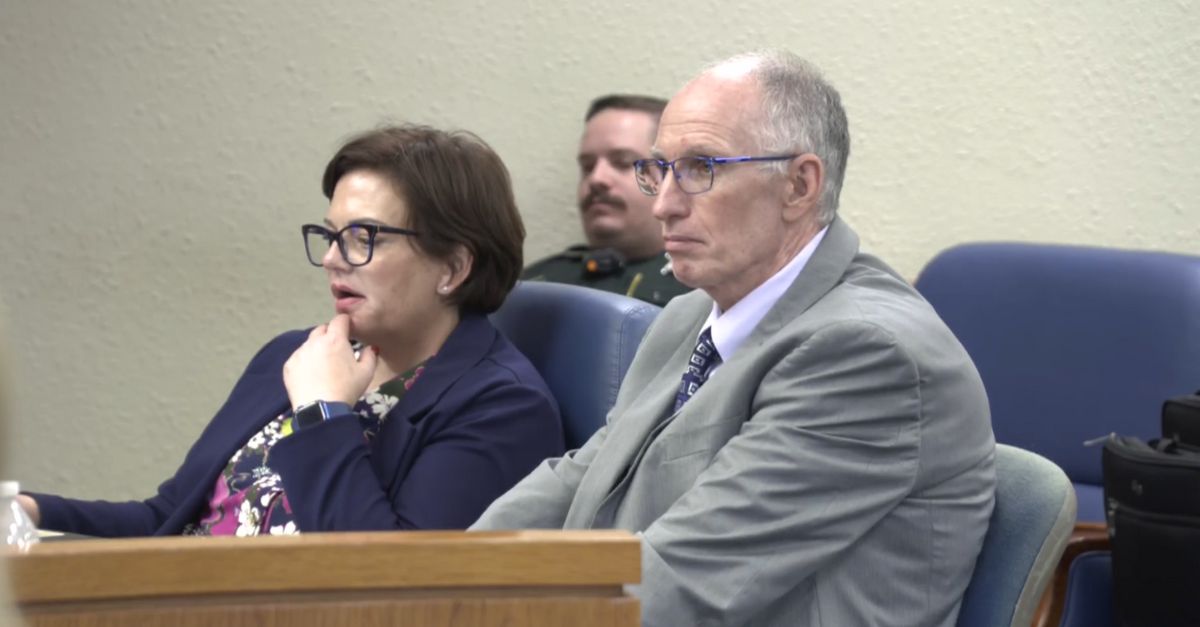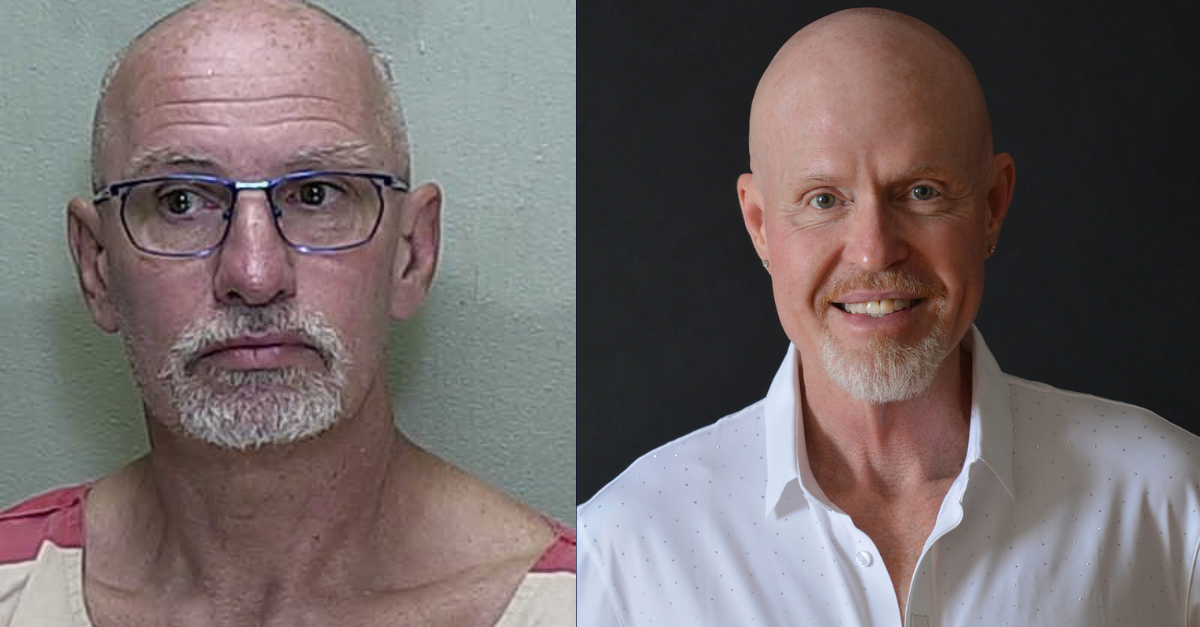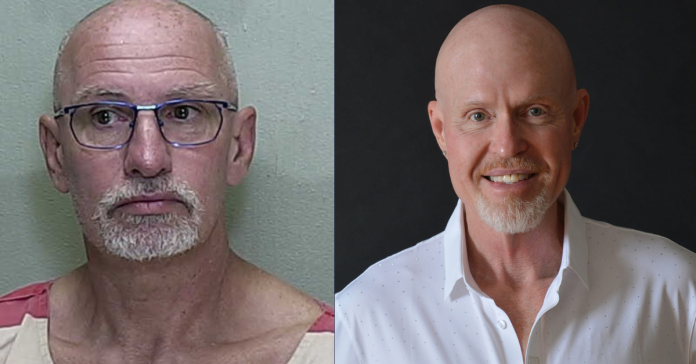
Herbert Swilley (in gray suit) sits with one of his defense attorneys as his murder trial begins in Florida (Law&Crime Network).
A Florida man who is accused of murdering his husband and staging the crime scene heard opening statements in his murder trial on Monday.
Herbert Swilley, 55, was arrested in November 2023, months after his husband, 59-year-old Timothy Smith, was found dead in an apartment. On the night of March 23, 2023, Swilley allegedly gave Smith a massive dose of diphenhydramine — an antihistamine — as their family settled in at their home for the night. After Smith passed out, Swilley allegedly beat him and then strangled him to death.
Prosecutors said in their opening statements on Monday that Swilley carted his husband”s body to their other apartment and staged a crime scene that the defendant planned to blame on another sexual partner. Following the slaying, Swilley then notably started a GoFundMe page to raise money for a “celebration of life” for Smith that was later taken down, authorities said.
Love true crime? Sign up for our newsletter, The Law&Crime Docket, to get the latest real-life crime stories delivered right to your inbox.
In her opening statement following jury selection, prosecutor Amy Beth Berndt outlined the marriage between Smith and Swilley that eventually became tumultuous. As Smith took on the role of breadwinner, Swilley continued working as a handyman and depended on Smith’s income to maintain the lifestyle they both desired. “Over time,” Berndt said, Swilley “grew bitter.”
Both men had struggled with alcohol and turned to Alcoholics Anonymous. But Berndt said “Once the drinking stopped, the problem is, the arguing started.”
Smith was looking for a new job in another county, which would give him a chance to leave Swilley, Berndt said.
Swilley allegedly told a friend, “If Tim thinks he’s leaving me and taking a new job in DeLand, he’s got another thing coming.” He then allegedly referred to Smith in the past tense, saying that he and his daughter “loved Tim.”
Berndt told the court that Swilley was “mad. He feels cheated. He thinks Tim owes him. And he’s not gonna let Tim leave him like that.” Swilley allegedly only had one option: Smith had to die. Berndt cited a $333,000 life insurance policy on Smith and a retirement plan with $48,000 in it. Swilley was the beneficiary of both.
More from Law&Crime: Man who allegedly asked for immunity is arrested as husband’s accused murderer
“He picked the date: March 23, Thursday, of 2023.” This was right before Smith’s final job interview.
Swilley needed the “easiest and quietest way” to kill Smith, so he decided to drug him, Berndt said. “That way, Tim couldn’t fight back.” He allegedly went with diphenhydramine, and Smith had so much in his system that he likely never felt the attack. Berndt said “The defendant beat him,” and then “put that ligature over Tim’s neck. And he squeezed it so tight and for so long that he broke Tim’s neck.”
Swilley then allegedly planned to blame one of Smith’s other sexual partners for his death. Berndt said Swilley drove Smith’s body to their second apartment, where the couple used to take other sexual partners and engage in other sexual activities away from Swilley’s teenage daughter. Swilley then staged the scene to look like someone had killed Smith in that apartment during a date gone wrong.
And it all happened, Berndt said, while Swilley’s daughter was in their home. The following morning, she asked her father where Smith was. He said he did not know, then asked her if she had heard anything. She responded that she might have heard a door. He allegedly told her, “You didn’t hear anything. That’s all you need to remember.”
He also allegedly told her, “If anybody asks, I was home all night.”

Herbert Kurt Swilley, left, murdered his husband, Timothy Floyd Smith, right, deputies said (Marion County Sheriff’s Office).
Berndt said that in the days that followed, Swilley attended an AA meeting where he was reportedly “red-faced, sweaty, nervous, fidgety.” He allegedly told his friends he and Smith got into a fight, and he did not know where he was, except he knew Smith’s Jeep was at the apartment. They told him, “You’re a handyman. Take the lock off the door and see if he’s in there.”
Swilley said his name was not on the lease, and he could be arrested for burglary. Eventually, the landlord allowed the sheriff’s office inside, where Smith was found dead.
Following the state’s opening, defense attorney John Nicholas Klein outlined a different scenario concerning the couple’s not-so-secret apartment. Klein told the court that Smith stopped using the Life360 location app regularly because he did not want Swilley to know his whereabouts. Calling both men “imperfect,” Klein said Smith was able to overcome his issues with alcohol and food through recovery programs, but instead turned to sex. Klein also claimed that Smith was the only one who used the apartment to have encounters with other men.
The neighbors at that apartment began to notice the “traffic” coming in and out of the apartment, including a blonde, white man who was seen around the area, Klein said, noting that DNA found in the apartment matched prior offenders who he claimed were not thoroughly investigated. One of the detectives also “made up his mind” that it was Swilley who committed the crime and did not look into other suspects who were proven to have been inside the apartment at some point, the attorney alleged.
Klein said there was room enough for reasonable doubt that Swilley was the only person who could have murdered his husband. He further said that evidence that seemingly pointed to Swilley driving Smith’s vehicle or his own vehicle to Smith’s apartment could not confirm him as the driver.
Nor, Klein said, was there evidence that placed Swilley at the apartment on the night Smith was killed.
After having a charge of tampering with evidence dropped, Swilley is now charged with first-degree premeditated murder. Prosecutors are not seeking the death penalty.

